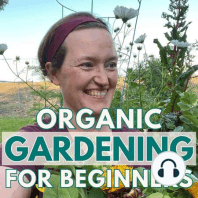11 min listen

010: What To Do In Your July Garden
FromOrganic Gardening For Beginners: Tips To Plan And Grow Your Own Productive Garden
010: What To Do In Your July Garden
FromOrganic Gardening For Beginners: Tips To Plan And Grow Your Own Productive Garden
ratings:
Length:
16 minutes
Released:
Jul 1, 2023
Format:
Podcast episode
Description
Ready to keep your summer garden beautiful and productive? This episode has essential July gardening tips, which will help you create a vibrant and flourishing outdoor space that you can be proud of. In July, your garden will benefit from a host of maintenance tasks. For instance, you should cut back spring flowers and vegetables that have completed their season. A pro tip here is to leave the roots in the ground. This simple act can be a game-changer for your soil health. It not only requires less work but also leaves beneficial microorganisms in place. Another essential gardening skill is deadheading. This involves cutting off old flowers from the plant and encouraging more flowers to bloom throughout the summer. Did you know that snapdragons and pansies can bring a second flush of flowers in the fall? By cutting them back and watering them through the summer, you can enjoy their beauty in the autumn too.July is also the perfect time to focus on garden maintenance and planning. Do you have heavy feeders in your garden? Consider adding compost or worm castings. Mulching is another crucial task for July, as it helps improve the soil's health and moisture retention. Keeping detailed garden records is another valuable tip. Note down the performance of your spring plantings, signs of diseases or bugs, and the last frost dates. This information will come in handy for future gardening activities. If you're planning on a vacation, don't forget to get a garden babysitter. They can help with watering, harvesting, and keeping an eye out for pests. Also, consider creating a delightful bird bath. This not only aids local birdlife but also adds an aesthetic element to your garden. Even though it's still summer, now is the time to start prepping for a bountiful fall garden (more on that in a future episode). This might involve planting some summer seedlings like zinnias or basil and adding fresh compost. It's also crucial to keep an eye out for pests and diseases. The sooner you catch them, the easier they are to manage.Keeping on top of these tasks will ultimately make your summer garden better and more productive. Happy gardening!**at the 6:30 minute mark, I mention planting cucumbers where they can get some afternoon sun, but I meant to say afternoon shade. Cucumbers will sometimes wilt in the heat of the day before perking back up at night, but you can save them the heat stress by providing a little shade in the hot afternoons. Get the full show notes and important links on the episode page here: https://homegrownfoodandflowers.com/episode-010/? Questions? Email me at jessica@homegrownfoodandflowers.comPlease leave a review on Apple Podcasts. It helps new gardeners find the show ?? Website and Blog: Homegrown Food and Flowers? Instagram: https://www.instagram.com/homegrownfoodandflowers/
Released:
Jul 1, 2023
Format:
Podcast episode
Titles in the series (54)
002: Top 5 Gardening Mistakes To Avoid As A Beginner by Organic Gardening For Beginners: Tips To Plan And Grow Your Own Productive Garden